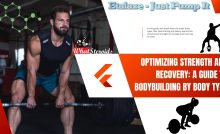All Bodybuilding Categories Explained


Bodybuilding is quite broad, and few people understand the various categories therein. Doing something you will not regret later, especially concerning bodybuilding, is advisable. Sometimes also known as divisions, these categories are what professional bodybuilders compete in during contests. These things can easily overwhelm someone, especially if you're taking part in competitive bodybuilding for the first time. Please note that you can only specialize in a few bodybuilding categories available. However, before deciding on the perfect division that fits you, you must understand what each entails and everything else you need to know to perform well. You might not get someone to sit you down and take you through the various bodybuilding categories, at least not in the gym. Here are all the bodybuilding categories explained.
Bodybuilding
It is the most popular and muscular fitness division and comes in all bodybuilding categories explained. Additionally, it is broad, with many classes within it. Anyone can participate in this category as there is no limit on age and the number of weights one can lift. Most importantly, this category is all about weightlifting. The bodybuilding category is synonymous with the trunk posture, where the entire leg and glutes are the main areas to show. Your butt and other regions around it are the places to focus on, alongside the hands, legs, and posterior. It is a division reserved for people who are obsessed with building muscle. The bodybuilding category is the least favorite for women due to the need for big muscles to participate.
Related Article:: How to Retain Your Physique After Retiring from Bodybuilding
Men's Physique
A division created in 2013, men's physique is a relatively new bodybuilding category but is gaining popularity. It also differs from other bodybuilding categories in that the judges focus on the general body structure rather than masculinity. Although it is not a bodybuilding competition, you must excel to boost your chances of excelling in competitive divisions. Additionally, new bodybuilders need an appealing body structure and ratio to maintain a lasting presence in the field. The things judges often look for include an impressive shoulder-to-waist ratio. A good symmetry will go a long way in ensuring the bodybuilder gains muscle uniformly once they start training for contests. And just like the bodybuilding division, men's physique has several classes, including:
Bantamweight (up to 143.25lbs)
Lightweight (143.25 – 154.25lbs)
Middleweight (154.25 – 176.25lbs)
Light Heavyweight (176.25 – 198.25lbs)
Heavyweight (198.25 – 225.25lbs)
Superheavyweight (over 225.25lbs)
This division has its own rules, unique from all bodybuilding categories explained here. For instance, participants should wear shorts when competing. The short has to be knee-length, and little emphasis is given to the development beneath. It means bodybuilders not doing well in thigh development will most likely succeed if they have a good structure from the shoulders to the waist. Most importantly, for participants who wish to participate in this division, their body fat must be less than 5%. It would be best to eliminate excess fat before tossing yourself on stage for this division. Those looking to specialize in this division must also learn the correct poses. For instance, they should start with a front position, followed by three-quarter turns. It is relatively different from the posing routine found in other bodybuilding categories.
Wellness
Wellness is a female category focusing more on fitness and wellness than muscle building. Unlike men's physique, this division involves developing the lower body (thighs, hips, and glutes) and putting less emphasis on the upper body. However, one should consider working more on the upper body to create an appealing symmetry. Ultimately, the goal of this division is to highlight and appreciate the beauty of the female body in the areas mentioned. The following classes are under this division:
Lightweight (up to 115lbs)
Middleweight (115 – 125lbs)
Light Heavyweight (125 – 140lbs)
Heavyweight (over 140 lbs)
212 Olympia
Created in 2011, this bodybuilding division is for short men who find it hard to fit into other divisions. Short men do not develop as much muscle as tall men do. This anatomical factor prevents them from competing favorably in divisions where huge muscle mass matters. Therefore, the division is only available for 212 lbs and below bodybuilders. Additionally, they must have a height of 5'5 or lower. With only tiny underwear, participants can use all seven bodybuilding poses where judges check the muscles' mass, separations, and conditioning. Flex Felix is among the notable bodybuilders who have excelled in this division.
Classic Physique
Men's classic physique is one of the bodybuilding divisions where both symmetry and muscle mass matter. Participants in this division wear tiny shorts that draw attention to deep lines in the glutes, hamstrings, and quads. Most importantly, conditioning is greatly improved, alongside mandatory postures and quarter-turns. The form-fitting shorts also draw attention to the trunks. You will come across the following classes in this division:
Height (cm) Weight (kg)
168 and below Height – 100 +4
171 and below Height – 100 +6
175 and below Height – 100+8
180 and below Height – 100+11
Over and including 180 Height – 100+13
More than and including 190 Height -100+15
Over and including 198 Height – 100+17
Bodybuilders in this division show the entire body, including the right, left, front, and back sides. While at it, judges will check for symmetry and balance. They are also required to perform the mandatory postures and other routines at the end of the day.
Bikini
Must Read:: The Most Effective Growth Hormone Protocol For Fat Loss
It is the most popular women's division and rarely misses out on main bodybuilding competitions. The division doesn't require too much muscle, thus making it a favorite for women and newbies. Among all the bodybuilding categories explained, this one is attractive to women with a tiny waist, curvy body, and long, shapely legs. Most importantly, the judges are particularly interested in the participant's overall body structure, balance, and charisma. You will unlikely miss out on this division as it has few requirements. The only challenge would be huge competition from other participants. It is important to note that this division is for women in competitions.
Fitness
The fitness division focuses on strength and is a favorite of cheerleaders, gymnasts, and other fitness enthusiasts. Participants in this category usually have a killer body with good symmetry. It is not surprising that women are the majority in this division. You don't need a lot of muscle to excel in this division because its routine does not involve showing muscles. All you need is strength, moves or dances, and some charisma. Such movements or dances could come with good music in the background, and you could choose one for yourself. Additionally, this division slightly differs from traditional bodybuilding divisions that entirely focus on the physique. So, considering if you want more than muscle and body structure is the most appropriate division.
Women's Physique
It is an umbrella division for all female bodybuilding classes and categories. Generally, women in this division ought to be lean, muscular, and with good symmetry. Just like in the case of wellness, the emphasis is on developing the lower body more than the upper. However, judges will look for shape and body proportion, so you might want to work on the upper part. Other aspects such as marketability, muscle tone, confidence, and presence are considerations in picking a winner. Participants must carefully balance all these things to increase their chances of doing well overall. Concerning the dressing, they put on two-piece suits with a V-shaped bottom. Posing involves quarter-turns and other routines found in traditional bodybuilding.
Games Classic Bodybuilding
Another division for men who cannot compete favorably in regular categories, this particular one is for men with relatively small muscle mass. Therefore, more emphasis is on the participant's overall structure. Some things that will matter here include; symmetry and overall physique. The fact that there is limited muscle mass means the judges will look at other factors such as confidence, conditioning, stage presence, and marketability.
Mixed Pairs
Here, a man and a woman compete in the same male or female category. For instance, a female can compete with a male partner in the men's category and vice versa. Apart from the mixed pairs, everything else about this category is similar to traditional male divisions where judges look at symmetry, skin tone, confidence, the poses, among others. The judges also look at how the pair complement each other and deliver their verdict based on how well they match. Therefore, the kind of partner you choose determines how you will perform.
Overall
With so many divisions and classes from which participants can choose, bodybuilding is enough cake for everyone that throws their hat in the ring. However, bodybuilders and other fitness enthusiasts must pick a division that works for them because everybody has a unique body. Most importantly, choose a good one among all the bodybuilding categories explained here that does not put too much pressure on you in the long term. But you can always try several divisions to determine which one you best excel in. Otherwise, we hope you find where your heart is and be the best. Remember to go through our blog for more informative articles on fitness.
Recent Posts
Optimizing Strength and Recovery: A Guide to Bodybuilding by Body Type
Every body tells a different story—and in bodybuilding, honoring that story is the key to…
Fitness Lessons from A Navy Seal’s Training Routine
Navy SEAL training is designed to forge elite tactical athletes. It’s not your average gym…
Exploring BPC-157 Healing Properties
BPC-157 is a synthetic peptide derived from a protein found in the stomach, known for…
The Ultimate Guide to Foods That Support Hormonal Balance for Bodybuilders
Hormonal balance is crucial for bodybuilders aiming to maximize muscle growth, recovery, and overall health.…
Steroid Shops Review
osgear.se Reviews ⭐⭐⭐⭐⭐ Score: 97.78% Osgear has consistently maintained a 99% customer satisfaction rate across key…
ACE-031: A Powerful Myostatin Inhibitor
ACE-031 is a synthetic peptide designed to block myostatin, a natural regulator of muscle growth.…



